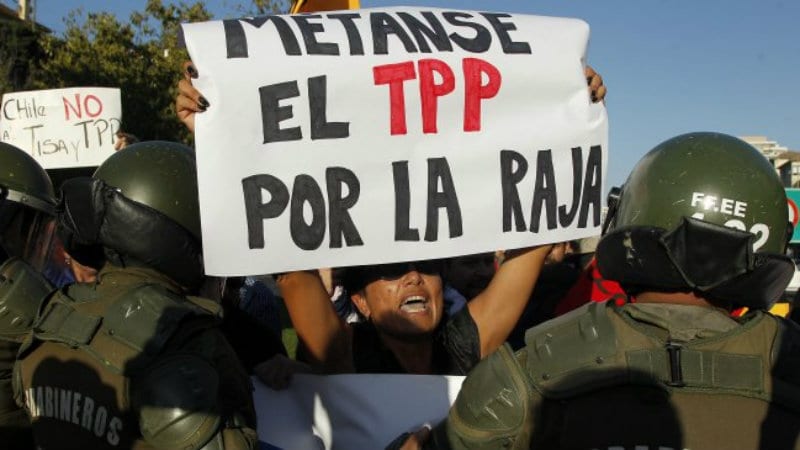
By Mohsin Abbas / The Santiago Times Staff
VIÑA DEL MAR — A protest march against Trans-Pacific Partnership led to detention of nearly a dozen people in northwest Chile on Tuesday.
Activists gathered in coastal town of Viña Del Mar to protest a summit of the TPP, earlier quashed by US President Donald Trump, with a message for trade ministers meeting in Chile: don’t try to revive the dead TPP.
Over 10 protestors, who were carrying placards, were arrested by the Chilean Carabinero police force while rest of them dispersed.
Activists took to the social media to denounce the treatment they received, charging that they were attacked with tear gas by the police force, and once dispersed they were arrested without being given any legal reasons.
“After being excessively repressed, members of the coalition find ourselves detained and are being driven around in a police bus,” one tweet reads.
A video posted on Twitter also showed riot police charging a crowd of protesters in order to disband them.
Trans-Pacific Partnership
Representing 40 percent of global GDP, the TPP participants includes Australia, Brunei, Canada, Chile, Japan, Malaysia, Mexico, New Zealand, Peru, Singapore, the United States, and Vietnam.
Also, China, Colombia and South Korea were there to discuss trade in the Asia-Pacific region and the new outlook for economic cooperation after the United States’ exit from the TPP.
Chilean Foreign Minister Heraldo Muñoz described the meeting as an “important political signal in moments of uncertainty,” calling for “greater clarity” as the country continues to pursue a “more open, more free” trade policy with “less protectionism.”
“Better off without the TPP”
Led by global organizations like Friends of the Earth, dozens of local groups from 15 different countries have urged the Chilean government in a letter to scrap the deal.
“We believe that the TPP text, negotiated in secret, served the interests of large corporations at the expense of governments’ rights to regulate in the public interest and of our fundamental rights as citizens,” stated the letter.
“We are better off without the TPP,” the letter continued.
“We urge you to accept that this model has failed, and to engage with us and others in a more open and democratic process to develop alternative approaches that genuinely serve the interests of our peoples, our nations and the planet,” the letter concluded.

